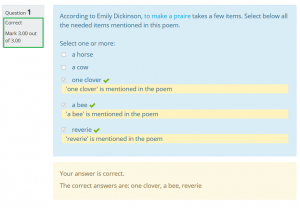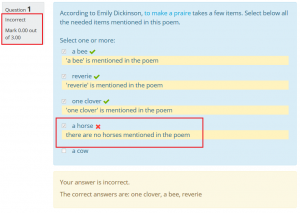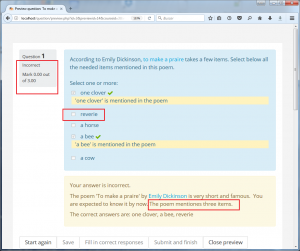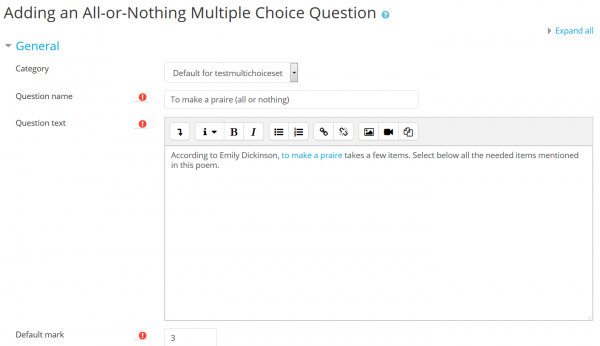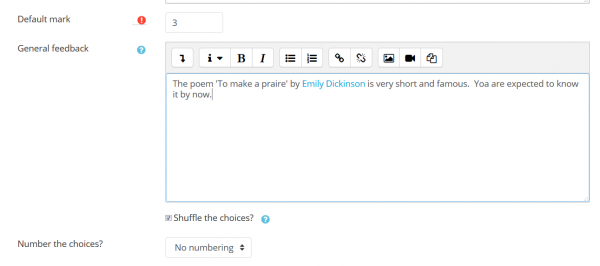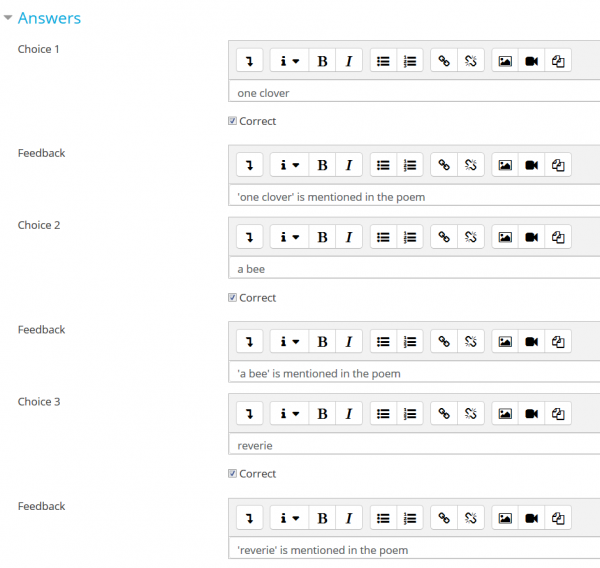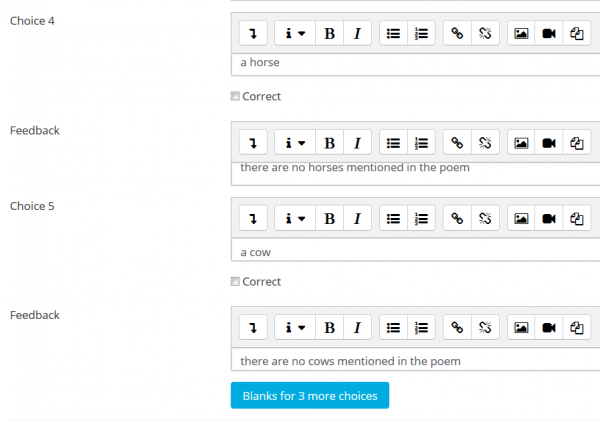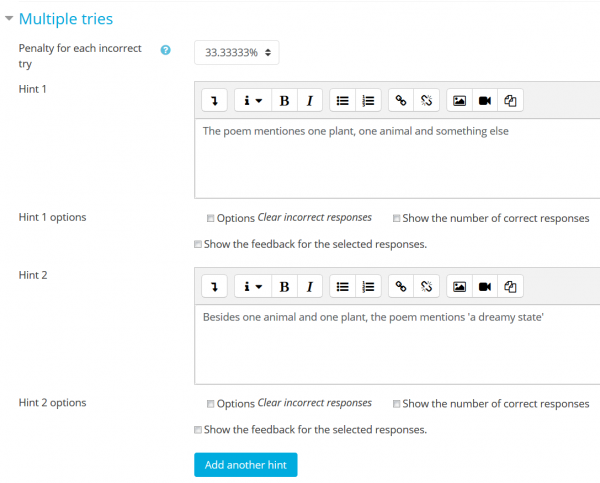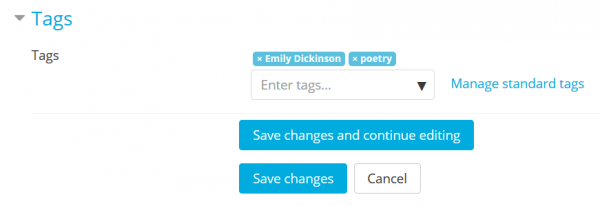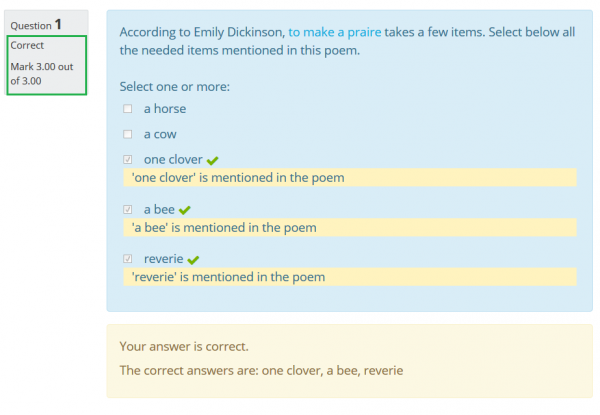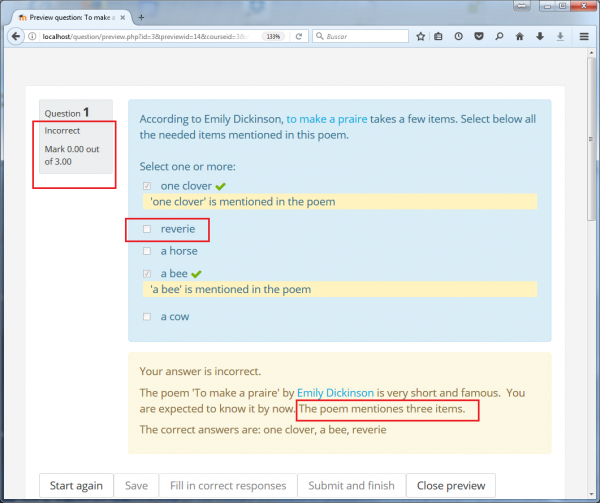All or nothing multiple choice question type
| All or nothing multiple choice question type | |
|---|---|
| Type | Question type |
| Set | N/A |
| Downloads | https://moodle.org/plugins/view.php?plugin=qtype_multichoiceset |
| Issues | https://github.com/ecampbell/moodle-qtype_multichoiceset/issues |
| Discussion | https://moodle.org/plugins/view.php?plugin=qtype_multichoiceset |
| Maintainer(s) | Eoin Campbell |
All or Nothing Question
This is a multiple-choice, multiple-response question type that was created by Adriane Boyd. It was later maintained by [Jean-Michel Vedrine], and now by [Eoin Campbell].
Description
The all or nothing question is adapted from the existing multiple choice question. The main difference from the standard Moodle multiple choice question is in the way that grading works. The teacher editing interface is slightly modified as when creating the question, the teacher just indicates which choices are correct. This question type is supported in the Moodle Mobile app version 3.5 and later.
Grading
- In an all-or-nothing multiple choice question, a respondent can choose one or more answers.
- If the chosen answers correspond exactly to the correct choices defined in the question, the respondent gets 100%.
- If the student chooses any incorrect choices, or does not select all of the correct choices, the grade is 0%.
| Note: Before using this question type, teachers must really think if this grading is what they want. |
Indications for using this question type
- This question type is great for life-saving or death-causing, critical situations/procedures/steps in medicine or engineering.
- Missing one vital item in a surgery, or including a wrong medicine in a prescription, could have a disastrous effect on the well-being (or survival) of the patient being treated.
- One missing item or one contra-indicated step can compromise the safety of a bridge being designed/built.
- And one such mistake can/should have a big impact on the students' marks.
Contraindications for using this question type
- It would be too harsh to use this question type when asking an elementary student to choose 5 out of 10 little-known cities located in the African continent in one geography quiz.
- If the students have not been convinced about the rationale for this peculiar way of marking, there may be complains and outcries of 'teacher unfairness' if a teacher uses this question type for summative assessment. Many students are used to getting half the points for choosing half of the correct choices !
Download
https://moodle.org/plugins/view.php?plugin=qtype_multichoiceset from the Moodle plugins database
Example question
What the teacher does
After choosing to make a new all-or-nothing Multiple Choice question, you must:
- Write the question name. Choose a name that will make it easy to identify this question inside your question bank.
- Write the question text. State precisely what the student needs to do in order to get this question right. Some groups of students may need more detailed information than others, and you must know the needs of your students and write the questions accordingly.
- You must choose the default mark for this question (the default is 1).
- It is usually a good idea to write an appropiate general feedback paragraph.
- You must think which numbering scheme will be used for the choices ('No numbering' is used here).
- It is advisable to write first all the correct (needed) choices and check the 'Correct' checkboxes for these choices. There are three correct choices in this example:
- Now you can add a couple of distractor choices.
- If you want to allow multiple tries, you can write the hints and choose whether you want to clear the incorrect responses, show the number of correct ones and show the feedback for the selected ones.
- If you use Tags you can choose the ones that apply to this question
What the student sees
- The question looks exactly the same as a regular multiple choice question when the student takes the quiz.
- The difference is in the marking. If the student choosed all the correct choices, the student gets full points, just as in the standard multiple choice question .
- But, If the student choose one (or more) incorrect choice, the student gets 0 points.
- Or, If the student fails to choose one (or more) of the correct choices, the student gets 0 points.
- If the student will be shown the general feedback, you should check that the feedback is actually adequate for explaining what was wrong with the student's choices.
